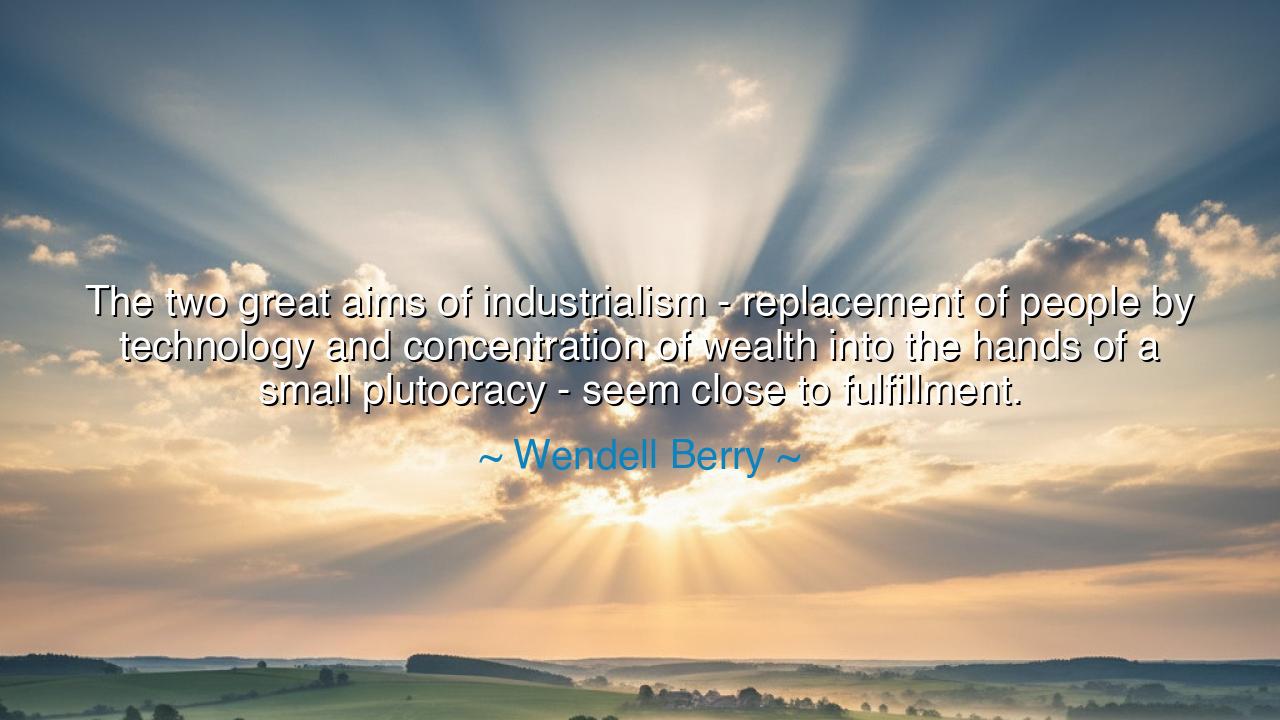
The two great aims of industrialism - replacement of people by
The two great aims of industrialism - replacement of people by technology and concentration of wealth into the hands of a small plutocracy - seem close to fulfillment.






Hear the solemn words of the agrarian prophet Wendell Berry, who spoke with sorrow and warning: “The two great aims of industrialism—replacement of people by technology and concentration of wealth into the hands of a small plutocracy—seem close to fulfillment.” These are not idle words, but a lamentation and a prophecy. They are the voice of a man who has watched the land, the people, and the old ways diminish under the weight of machines and empires of money. His words are a cry to awaken the generations, lest humanity lose not only its labor, but its very soul.
For in ages past, work was the bond between man and earth. The farmer tilled the soil with his hands, the craftsman shaped wood and stone with patient skill, and families were sustained by the fruit of their own labor. But technology, once a servant, became master. Machines replaced hands, and soon the worker was cast aside like a tool no longer needed. Industrialism promised efficiency and abundance, yet it also brought alienation, for the dignity of labor was exchanged for the cold hum of automation.
And with the rise of the machine came the rise of the few. The wealth that once flowed through villages, towns, and marketplaces began to flow upward, like a river diverted, until it filled only the reservoirs of the mighty. The plutocracy, a rule of wealth by the few, emerged as lords of this new age, holding dominion not over acres of land, but over factories, banks, and now even the digital empires of the modern world. Thus did Berry, like a prophet of old, see clearly the danger: when the many are displaced, and the few enriched, the balance of society falters and the foundations of justice crack.
Recall, if you will, the story of the Industrial Revolution in England. The loom, once tended by artisans in cottage homes, was taken into great factories. Families who had woven for generations found their skills worthless. They crowded into cities, working for meager wages, while a handful of factory owners amassed fortunes beyond measure. This was the fulfillment of Berry’s warning centuries before he gave it: technology replacing people, and wealth concentrating into few hands. And though time has passed, the same shadow grows again in our own day, now cloaked in the language of automation and artificial intelligence.
Yet his words are not only a dirge but also a challenge. For it is not technology itself that must be feared, but the misuse of it. A plow can feed the hungry; a machine can free hands for creativity. But when technology becomes the tool of greed, when it serves not the people but only the plutocracy, then it becomes a chain, not a blessing. The true measure is this: does progress lift the many, or does it enthrone the few? If it does the latter, then we have mistaken destruction for advancement.
The lesson is thus: be vigilant in this age of speed and invention. Do not surrender your humanity to machines, nor your communities to faceless wealth. Honor labor, whether of hand or mind, and resist the blindness that calls all efficiency good. Demand that technology serve justice, that wealth serve the common good, and that no small group of rulers dictate the lives of multitudes. For freedom is not preserved by machines, but by the dignity and vigilance of the people.
Take action, beloved seeker: cultivate skills that root you in life, not merely in systems. Support the small over the vast, the local over the empire, the just over the profitable. Question the promises of every new machine, and ask: does it serve life, or diminish it? Share your labor and wealth with others, and do not let the world be handed wholly to a plutocracy that knows neither soil nor soul.
And so Wendell Berry’s voice echoes like an ancient oracle: industrialism seeks to displace the many and enthrone the few. But you, listener, need not bow before it. Build communities of resilience, live with reverence for land and people, and let your wealth be measured not in coin, but in justice, beauty, and the ties of love. In this way, you will stand against the tide, and the prophecy of despair may yet be turned into a future of hope.






AAdministratorAdministrator
Welcome, honored guests. Please leave a comment, we will respond soon